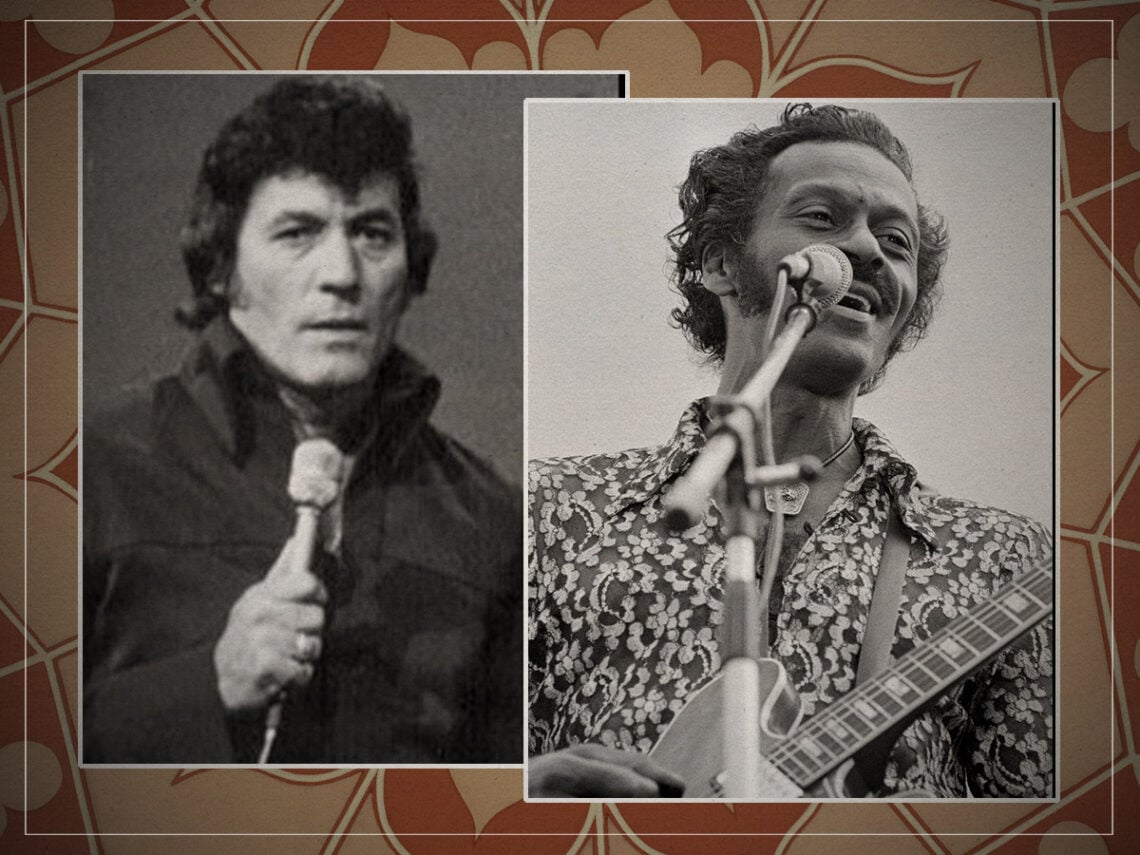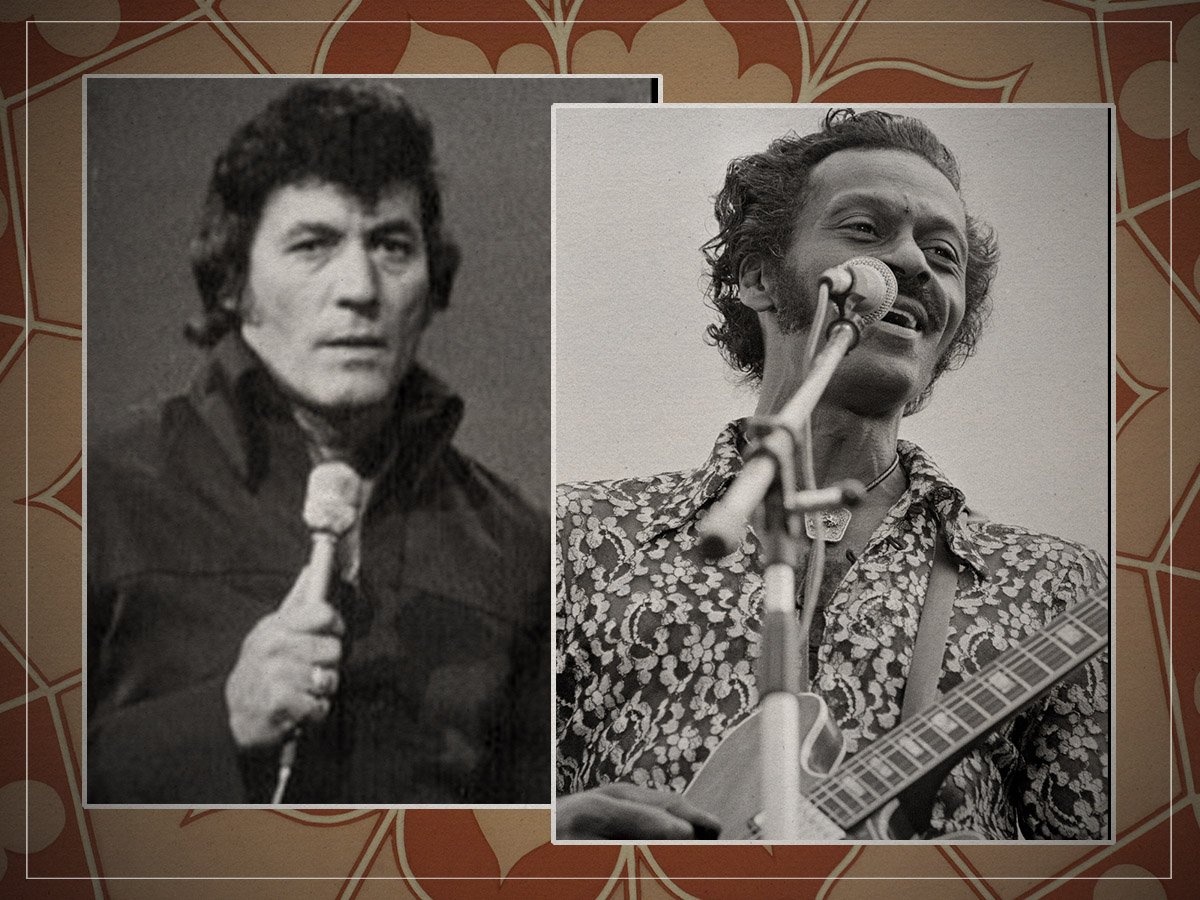
Credits: Far Out / CBS Television / Public Domain / JOKA Journalistic Photo Archive / VK Hietanen Collection
Sat 14 June 2025 20:30, UK
Striking fear into the hearts of every parent, teacher, and authority figure around, the United States was on the brink of a true musical revolution during the mid-1950s; it was the first age of rock ‘n’ roll. Almost immediately, a select few artists rose to the top of that pioneering scene, and Chuck Berry was certainly one of them. With seemingly endless resources of energy and an arsenal of face-melting R&B guitar riffs, he was the perfect poster boy for this emerging revolution, but it took him a few more years to amass an audience outside of the US.
Despite the rich rock landscape of the United Kingdom during the 1960s, punctuated by the likes of The Rolling Stones, The Yardbirds, and, of course, The Beatles, the nation took a little longer to catch on to the emerging sounds of rock and roll during the previous decade. This was thanks, in part, to mainstream radio stations and their open animosity towards rock music, but it was also as a result of poor international distribution from American rock labels like Chess, which played host to Chuck Berry.
So, although niche audiences in the UK were exposed to the incredible sounds of ‘Johnny B. Goode’ through pirate radio stations like Radio Caroline, the rock pioneer didn’t witness much mainstream success on this sceptred isle until 1963. PYE Records struck a deal with Chess, which allowed the label access to Berry’s entire back catalogue, leading to a run of reissues for the UK market, which launched the guitarist to the heights of the pop charts almost instantly.
Inevitably, a tour was planned in support of these releases, but by the early to mid-1960s, Berry was a very different person from what he had been when he first recorded those early hits in America. In 1959, the songwriter allegedly transported a 14-year-old girl across state lines in order for her to work at his club, Berry’s Club Bandstand in St Louis. Berry was also accused of raping the young girl, and was found guilty during a trial in 1962, sentenced to three-years imprisonment for his crimes.
In the end, Berry only served one-and-a-half years for the rape and trafficking of a 14-year-old girl, and his release coincided with his newfound popularity in the United Kingdom. Quickly, a 1964 tour was cobbled together that would see Berry headline a bill which included Carl Perkins, The Animals, The Nashville Teens, Kingsize Taylor & The Dominos, and The Swinging Blue Jeans – the latter of whom was replaced by Gene Vincent after only a handful of shows.
Perkins, as the undisputed king of rockabilly, had crossed paths with Berry previously, and he seemed to admire the guitarist greatly, once commenting, “I respected his writing; his records were very, very great.” However, when the pair came over to the UK, Perkins found Berry almost unrecognisable from that star he had rubbed shoulders with back in the 1950s. ”I never saw a man so changed,” he declared.
“He had been an easy-going guy before, the kinda guy who’d jam in dressing rooms, sit and swap licks and jokes,” the rockabilly legend explained. “In England, he was cold, real distant and bitter.” However, the artist theorised that the change wasn’t just as a result of the months he had spent behind bars. “It wasn’t just jail, it was those years of one-nighters, grinding it out like that can kill a man, but I figure it was mostly jail.”
Even still, the tour was quite a success for both Perkins and Berry. After all, the likes of The Rolling Stones and The Beatles were regularly performing covers of the rock guitar progenitor, so his music already had an underlying presence in the United Kingdom. Starting in Finsbury Park and visiting places like Bradford, Exeter, Glasgow, and, finally, Hammersmith, the tour was extensive and firmly established Berry’s unique appeal on both sides of the Atlantic.
Related Topics
The Far Out Music Newsletter
All the latest music news from the independant voice of culture.
Straight to your inbox.
